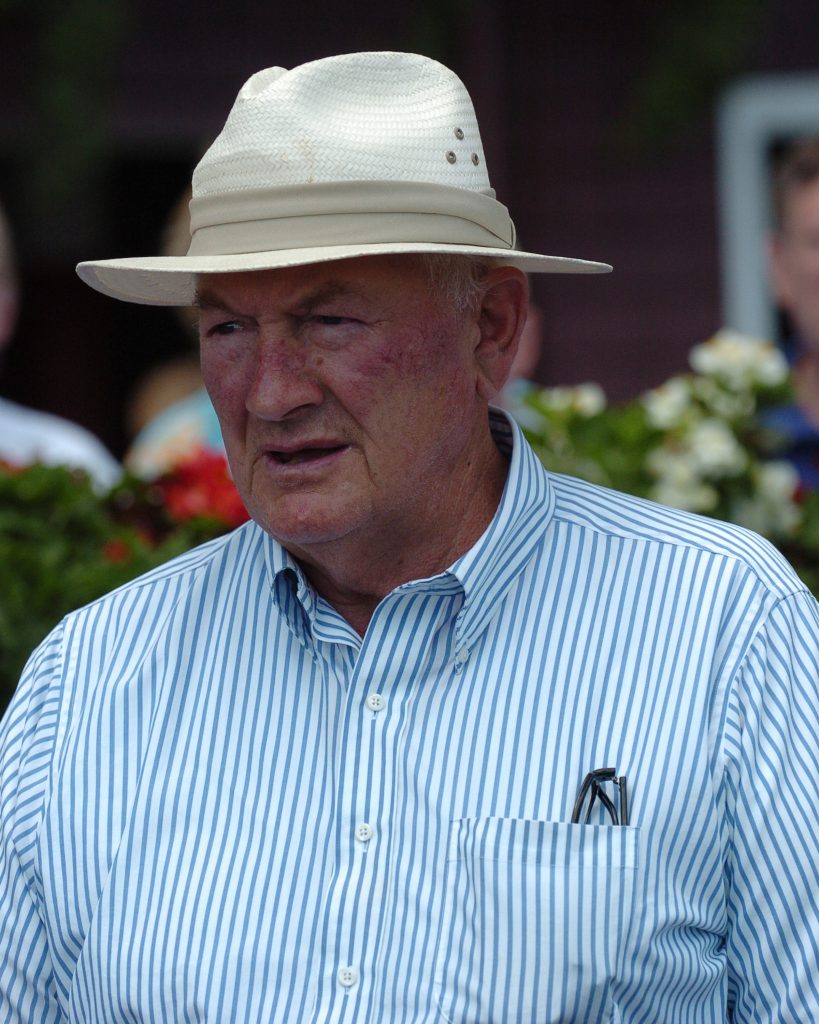
By: Charles Simon
He knew who I was the day I went and asked him for a job. Walking into Allen Jerkens office and asking him to hire me was perhaps the boldest move that I had made up to that point in my life. An assistant of his had gotten himself into some trouble with the law and Jerkens had an opening, something that happened about as often as horses won the triple crown.
He knew my past performances, who I worked for, who I was friends with. He had watched me when I was in the barn across the street with Tom Skiffington. He knew I could work hard because he had seen it first hand. Yet why would a Hall of fame trainer with a full barn of horses be paying attention to an obscure young assistant that worked in a different barn? As I was to find out over the coming years it was because H. Allen Jerkens paid attention to everything.
“Why do you want to work for me,” asked in that high pitched voice that belied his imposing physical stature, “you have been working for all those fancy guys?”
I had worked for Skiffington and Wayne Lukas and Nick Zito and the decidedly non-fancy Pistol Pete Ferriola but a position in the Chiefs shedrow was like assisting Michelangelo in painting the ceiling of the Sistine chapel.
“I want to be a horse trainer, not a movie star,” I snapped back at him.
He got that smirk on his face that said that you had said the right thing and said, “Ok be here tomorrow morning”
Tomorrow morning morphed into a six year stint under an absolute master at his craft who also just happened to be one of the best people that has ever walked down a shedrow.
Allen Jerkens was a legend to me long before the day I asked him for a job. Growing up in the Saratoga region meant that horse trainers were stars to us kids and guys like the Chief and Woody Stephens were at the top of that list. Once I entered the insulated world of a thoroughbred backstretch I found the respect that the name Allen Jerkens commanded from seemingly the entire population was immense. Everyone wanted a job in his shedrow but it wasn’t easy work. The man at the top of the totem pole was right there beside you, all day, every day putting in the hard work. We put horses in ice three times a day, we hosed them, put feet in hot water tubs, picked dandelions to add to feed tubs, shedrowed in the afternoons and paddock schooled horses. Man did we paddock school horses.
It hardly felt like work though. We were on a mission, a mission to figure out how to get our horses as sound and happy as we could. The Chief was like a football coach, wandering about the barn, poking and prodding us to do that little extra, rub those legs a little longer, clean those stalls a little cleaner, brush those coats a little bit better.
He had all these phrases that he would use, some self deprecating, some just pure motivational.
“Chuck how are we ever gonna beat Shug or Mott? Those guys are great trainers and they have better horses than we do? How can we ever beat them?”
I would generally just kinda wait for him to answer his own rhetorical question.
“We gotta outwork them! We gotta put our horses in more ice, we gotta school them more, we gotta rub those legs harder. Leave no stone unturned!”
And then he would walk off to the feed room to mess with the oats or some other menial task that he would do to trying to unwind that morning’s training in his mind more than anything.
We won lots of races during my time working for the great Allen Jerkens. Yet the times I remember most are quiet times at the barn. He wasn’t the type to tell you what to do but he would be giving you advice and you didn’t even know it.
There was the time I was a little hungover after one of those crazy Saratoga nights. He didn’t hardly say a word to me the entire morning though I was also making great effort to duck him when I could. He finally got in his big maroon Caddy and drove away presumably to go home and take his daily nap before coming back to the barn in the afternoon. When he left I finally breathed a sigh of relief as I seemingly avoided his wraith which could be boisterous to say the least. I went into the tack room in the middle of the barn to see what he had written on the white board, our schedule for that afternoon’s barn chores. He had written down seven horses to paddock school and had my name next to all of them! Just as I was picking up my jaw from the floor, he pulled up outside the shedrow in the caddy and rolled down the window.
“I’m old but I’m not blind”
Then he drove off leaving me with the work of half a dozen men. Yet the lesson was learned and I never showed up for work hungover again.
There were so many little things that he said, almost throw away lines but when you started hearing them over and over again, they began to stick.
He used to go back to the barn after he had dinner. Would have the night watchman or whoever else he recruited that night push the feed cart seeing who ate and giving an extra scoop to those who had cleaned their tubs. One day I asked why?
“Horses tell you a lot when they are resting. When it’s quiet, they relax and you get a better read on them.”
“Look how they are standing. Look at how they stretch out to pee. See if they pull their straw underneath them. I want to see who is eating up and who is not too.”
I asked him why grooms had three different colored water buckets and feed tubs?
He said, “well if they are all the same color it’s easier to get them mixed up. It’s hard to put a blue feed tub in a stall with a orange water bucket.”
It was so simple and logical but I had never seen anyone do it before and haven’t seen anyone do it since.
Jockeys always seemed to be a hot topic. Chief would give lesser name riders more chances on good horses than anyone which of course made everyone crazy when they lost. He said he would rather ride someone more familiar with the horse, someone a little hungry than the mercenary jocks at the top of the standings. Yet most of the time when it came to his best horses the big names were usually named. Jacinto Vasquez rode Onion when he beat Secretariat at Saratoga. Jorge Velasquez rode Prove Out when he beat Secretariat in the Woodward. Mike Smith was the regular rider of Devil His Due and Sky Beauty. Julie Krone and Robbie Davis rode Classy Mirage in all of her stakes wins. Bill Boland rode Beau Purple who only managed to beat the mighty Kelso three times in four starts!
Yet they still seemed to frustrate him, pretty much more than anything else.
“Why don’t riders come into the stretch with the stick in the left hand?”
I must have heard his say that 1000 times. He used to talk about how some jockey from a bygone era, maybe Johnny Rotz or Eddie Belmonte or some other top jock that I had never seen would ride differently than the current guys. Chief would get animated and say he would wait and wait and wait in the stretch before he went to use the whip. He would say, “he would wait till the very last minute then bang, bang, bang and the horse would give him just that last bit of try he had in him right before the wire. He won a lot of races by being patient.”
He loved Pat Day. Said to me more than once, “I don’t know why one of those sheikhs don’t give him a million dollars a year to work and ride all their big horses. They would do so much better than they do and it’s not like they would miss it.”
One day at Gulfstream, I think it was 1997, I heard him say to no one in particular, “ I don’t know why that tall boy hasn’t gotten more chances, you can tell that he has what it takes. I can’t figure it out?”
That tall boy was Ramon Dominguez before he was Ramon Dominguez. He eventually got that chance and the Chief had seen his talent way before anyone else did.
I could go on and on and on yet I was only there for a small fraction of his glorious career. He won the Suburban Handicap four times, the first time in 1962 and the last time in 2007. The Jockey Club Gold Cup three times, first in 1973 and the last in 1998. His long list of accomplishments and big stakes won would take up page after page yet was accomplished with a barn that rarely ever numbered over 40 horses at a time.
The Chief’s greatest feat was probably the number of friends that he had over the years. Everyone who came into contact with him left feeling like his friend even if he sometimes acted outwardly like he was the world’s biggest curmudgeon. He was always the softest touch on the backside, “lending” money to anyone in need, even those that worked in other barns.
He would probably hate many of the trends in today’s game, he was old school before old school was a thing. I miss him everyday though and I know that I’m not alone with that sentiment. The first race named after him was a 2 mile grass race at Gulfstream Park that was a nice gesture. NYRA renaming the Kings Bishop, the Allen Jerkens stakes is far more fitting for the location, the distance, the surface and prestige. It’s a natural fit since it was the Chief himself who trained Kings Bishop.
The King’s Bishop/Allen Jerkens (Gr.I) traditionally has been one of the highlights of the Saratoga racing season and this year that looks to be the case with a full field of talented runners. I’m sure that the Chief will be watching from his usual spot by the rail at the big track in the sky.
Charles Simon is the Co-Host of the Going In Circles Podcast.
Photo Credit: NYRA



